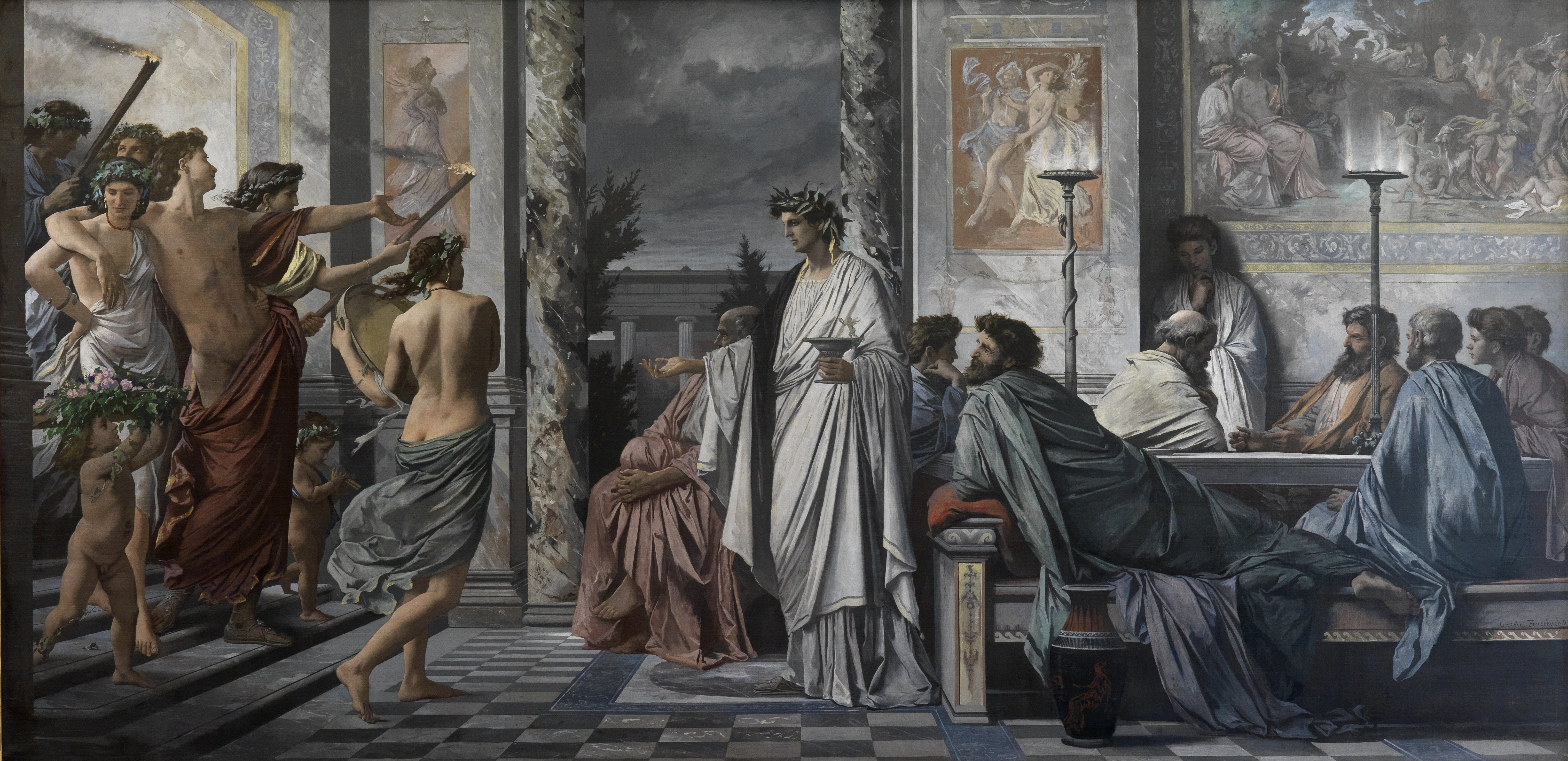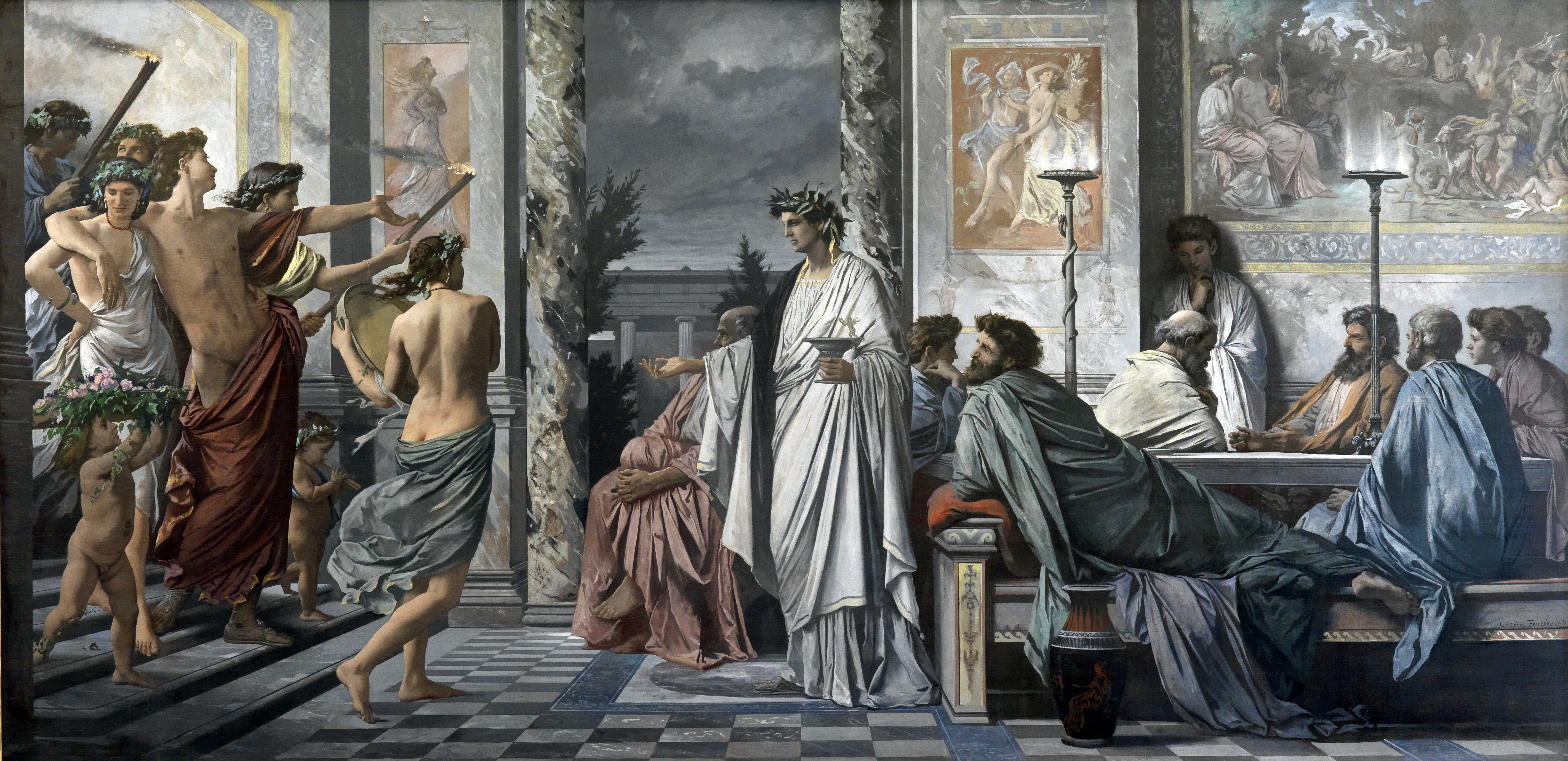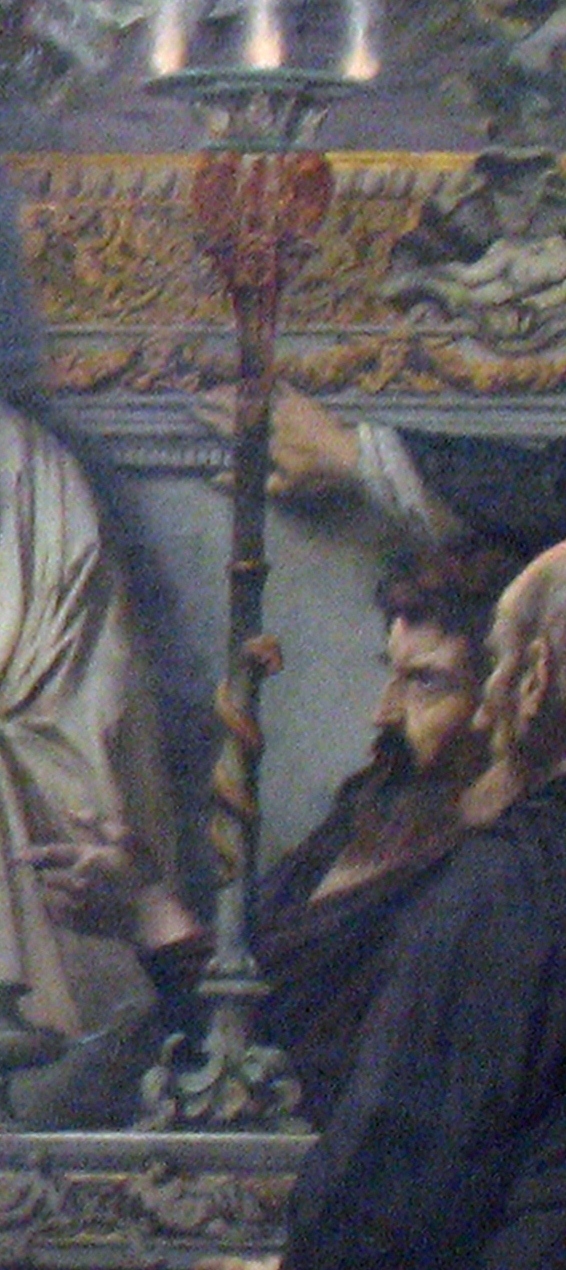|
Symposium (Plato)
The ''Symposium'' ( grc, Συμπόσιον, ) is a philosophical text by Plato, dated . It depicts a friendly contest of extemporaneous speeches given by a group of notable men attending a banquet. The men include the philosopher Socrates, the general and political figure Alcibiades, and the comic playwright Aristophanes. The speeches are to be given in praise of Eros, the god of love and desire. In the ''Symposium'', Eros is recognized both as erotic love and as a phenomenon capable of inspiring courage, valor, great deeds and works, and vanquishing man's natural fear of death. It is seen as transcending its earthly origins and attaining spiritual heights. This extraordinary elevation of the concept of love raises a question of whether some of the most extreme extents of meaning might be intended as humor or farce. ''Eros'' is almost always translated as "love", and the English word has its own varieties and ambiguities that provide additional challenges to the effort to under ... [...More Info...] [...Related Items...] OR: [Wikipedia] [Google] [Baidu] |
Editio Princeps
In classical scholarship, the ''editio princeps'' (plural: ''editiones principes'') of a work is the first printed edition of the work, that previously had existed only in manuscripts, which could be circulated only after being copied by hand. For example, the ''editio princeps'' of Homer is that of Demetrius Chalcondyles, now thought to be from 1488. The most important texts of classical Greek and Roman authors were for the most part produced in ''editiones principes'' in the years from 1465 to 1525, following the invention of the printing press around 1440.Briggs, Asa & Burke, Peter (2002) ''A Social History of the Media: from Gutenberg to the Internet'', Cambridge: Polity, pp. 15–23, 61–73. In some cases there were possibilities of partial publication, of publication first in translation (for example from Greek to Latin), and of a usage that simply equates with first edition. For a work with several strands of manuscript tradition that have diverged, such as '' Piers Plowma ... [...More Info...] [...Related Items...] OR: [Wikipedia] [Google] [Baidu] |
Aristophanes
Aristophanes (; grc, Ἀριστοφάνης, ; c. 446 – c. 386 BC), son of Philippus, of the deme In Ancient Greece, a deme or ( grc, δῆμος, plural: demoi, δημοι) was a suburb or a subdivision of Athens and other city-states. Demes as simple subdivisions of land in the countryside seem to have existed in the 6th century BC and ear ... Kydathenaion ( la, Cydathenaeum), was a comedy, comic playwright or comedy-writer of Classical Athens, ancient Athens and a poet of Ancient Greek comedy, Old Attic Comedy. Eleven of his forty plays survive virtually complete. These provide the most valuable examples of a genre of comic drama known as Ancient Greek comedy, Old Comedy and are used to define it, along with fragments from dozens of lost plays by Aristophanes and his contemporaries. Also known as "The Father of Comedy" and "the Prince of Ancient Comedy", Aristophanes has been said to recreate the life of ancient Athens more convincingly than any other author. His pow ... [...More Info...] [...Related Items...] OR: [Wikipedia] [Google] [Baidu] |
Athens
Athens ( ; el, Αθήνα, Athína ; grc, Ἀθῆναι, Athênai (pl.) ) is both the capital and largest city of Greece. With a population close to four million, it is also the seventh largest city in the European Union. Athens dominates and is the capital of the Attica region and is one of the world's oldest cities, with its recorded history spanning over 3,400 years and its earliest human presence beginning somewhere between the 11th and 7th millennia BC. Classical Athens was a powerful city-state. It was a centre for the arts, learning and philosophy, and the home of Plato's Academy and Aristotle's Lyceum. It is widely referred to as the cradle of Western civilization and the birthplace of democracy, largely because of its cultural and political influence on the European continent—particularly Ancient Rome. In modern times, Athens is a large cosmopolitan metropolis and central to economic, financial, industrial, maritime, political and cultural life in Gre ... [...More Info...] [...Related Items...] OR: [Wikipedia] [Google] [Baidu] |
Agathon
Agathon (; grc, Ἀγάθων; ) was an Athenian tragic poet whose works have been lost. He is best known for his appearance in Plato's ''Symposium,'' which describes the banquet given to celebrate his obtaining a prize for his first tragedy at the Lenaia in 416. He is also a prominent character in Aristophanes' comedy the ''Thesmophoriazusae''. Life and career Agathon was the son of Tisamenus, and the lover of Pausanias, with whom he appears in both the ''Symposium'' and Plato's ''Protagoras''. Together with Pausanias, he later moved to the court of Archelaus, king of Macedon, who was recruiting playwrights; it is here that he probably died around 401 BC. Agathon introduced certain innovations into the Greek theater: Aristotle tells us in the ''Poetics'' (1456a) that the characters and plot of his '' Anthos'' were original and not, following Athenian dramatic orthodoxy, borrowed from mythological or historical subjects. Agathon was also the first playwright to write choral ... [...More Info...] [...Related Items...] OR: [Wikipedia] [Google] [Baidu] |
Tragedy
Tragedy (from the grc-gre, τραγῳδία, ''tragōidia'', ''tragōidia'') is a genre of drama based on human suffering and, mainly, the terrible or sorrowful events that befall a main character. Traditionally, the intention of tragedy is to invoke an accompanying catharsis, or a "pain hatawakens pleasure", for the audience. While many cultures have developed forms that provoke this paradoxical response, the term ''tragedy'' often refers to a specific tradition of drama that has played a unique and important role historically in the self-definition of Western civilization. That tradition has been multiple and discontinuous, yet the term has often been used to invoke a powerful effect of cultural identity and historical continuity—"the Greeks and the Elizabethans, in one cultural form; Hellenes and Christians, in a common activity," as Raymond Williams puts it. From its origins in the theatre of ancient Greece 2500 years ago, from which there survives only a fra ... [...More Info...] [...Related Items...] OR: [Wikipedia] [Google] [Baidu] |
Encomium
''Encomium'' is a Latin word deriving from the Ancient Greek ''enkomion'' (), meaning "the praise of a person or thing." Another Latin equivalent is ''laudatio'', a speech in praise of someone or something. Originally was the song sung by the chorus at the κῶμος, or festal procession, held at the great national games in honour of the victor, either on the day of his victory or on its anniversary. The word came afterwards to denote any song written in celebration of distinguished persons, and in later times any spoken or written panegyric whatever. ''Encomium'' also refers to several distinct aspects of rhetoric: * A general category of oratory * A method within rhetorical pedagogy * A figure of speech praising a person or thing, but occurring on a smaller scale than an entire speech * The eighth exercise in the progymnasmata series * A literary genre that included five elements: prologue, birth and upbringing, acts of the person's life, comparisons used to praise the su ... [...More Info...] [...Related Items...] OR: [Wikipedia] [Google] [Baidu] |
Eryximachus
Eryximachus, son of Acumenus (; Greek: Ἐρυξίμαχος Ἀκουμένου ''Eruxímachos Akouménou''; c. 448 – late 5th century or early 4th century BCE) was an ancient Athenian physician who is best remembered for his prominent role in Plato's ''Symposium''. It is likely that he was indicted in the mutilation of the Herms, a domestic Athenian conflict during the Peloponnesian War.Debra Nails, ''The People of Plato'', Indianapolis: Hackett Publishing, 2002; pp. 134–135 Life The son of the physician Acumenus, Eryximachus was born in the mid-5th century BC. Set approximately in 433/2, Plato's ''Protagoras'' dialogue includes a depiction of his close friendship with Socrates' student Phaedrus, a friendship that continued into the dramatic time of the '' Phaedrus'' dialogue some 15 years later. His wealth and social status are unclear from the extant sources. An Eryximachus is mentioned in Andocides' ''On the Mysteries'' speech as among those indicted in the mutilation ... [...More Info...] [...Related Items...] OR: [Wikipedia] [Google] [Baidu] |
Symposium
In ancient Greece, the symposium ( grc-gre, συμπόσιον ''symposion'' or ''symposio'', from συμπίνειν ''sympinein'', "to drink together") was a part of a banquet that took place after the meal, when drinking for pleasure was accompanied by music, dancing, recitals, or conversation.Peter Garnsey, ''Food and Society in Classical Antiquity'' (Cambridge University Press, 1999), p. 13online Sara Elise Phang, ''Roman Military Service: Ideologies of Discipline in the Late Republic and Early Principate'' (Cambridge University Press, 2008), pp. 263–264. Literary works that describe or take place at a symposium include two Socratic dialogues, Plato's '' Symposium'' and Xenophon's '' Symposium'', as well as a number of Greek poems such as the elegies of Theognis of Megara. Symposia are depicted in Greek and Etruscan art that shows similar scenes. In modern usage, it has come to mean an academic conference or meeting such as a scientific conference. The equivalent of a Gr ... [...More Info...] [...Related Items...] OR: [Wikipedia] [Google] [Baidu] |
Diotima Of Mantinea
Diotima of Mantinea (; el, Διοτίμα; la, Diotīma) is the name or pseudonym of an ancient Greek character in Plato's dialogue '' Symposium'', possibly an actual historical figure, indicated as having lived circa 440 B.C. Her ideas and doctrine of ''Eros'' as reported by the character of Socrates in the dialogue are the origin of the concept today known as Platonic love. Identity The name Diotima means one who honors or is honored by Zeus, and her descriptor as "Mantinikê" (Mantinean) seems designed to draw attention to the word "''mantis''", which suggests an association with prophecy. Explicitly described as a foreigner (ξένη) (201e) and as wise (σοφὴ) in not only the subject of love but also of many other things (ἄλλα πολλά), she is often associated with priestcraft by a majority of scholars insofar as: 1 - she advises the Athenians on sacrifice (thusiai) which delayed the onset of a plague (201d), and 2 - her speech on eros utilizes the language of ... [...More Info...] [...Related Items...] OR: [Wikipedia] [Google] [Baidu] |
Oral Tradition
Oral tradition, or oral lore, is a form of human communication wherein knowledge, art, ideas and cultural material is received, preserved, and transmitted orally from one generation to another. Vansina, Jan: ''Oral Tradition as History'' (1985), reported statements from present generation which "specifies that the message must be oral statements spoken, sung or called out on musical instruments only"; "There must be transmission by word of mouth over at least a generation". He points out, "Our definition is a working definition for the use of historians. Sociologists, linguists or scholars of the verbal arts propose their own, which in, e.g., sociology, stresses common knowledge. In linguistics, features that distinguish the language from common dialogue (linguists), and in the verbal arts features of form and content that define art (folklorists)."Ki-Zerbo, Joseph: "Methodology and African Prehistory", 1990, ''UNESCO International Scientific Committee for the Drafting of a Gene ... [...More Info...] [...Related Items...] OR: [Wikipedia] [Google] [Baidu] |
Xenophon
Xenophon of Athens (; grc, wikt:Ξενοφῶν, Ξενοφῶν ; – probably 355 or 354 BC) was a Greek military leader, philosopher, and historian, born in Athens. At the age of 30, Xenophon was elected commander of one of the biggest Ancient Greek mercenaries, Greek mercenary armies of the Achaemenid Empire, the Ten Thousand, that marched on and came close to capturing Babylon in 401 BC. As the military historian Theodore Ayrault Dodge wrote, "the centuries since have devised nothing to surpass the genius of this warrior". Xenophon established precedents for many logistical operations, and was among the first to describe strategic flanking maneuvers and feints in combat. Xenophon's ''Anabasis (Xenophon), Anabasis'' recounts his adventures with the Ten Thousand while in the service of Cyrus the Younger, Cyrus's failed campaign to claim the Persian throne from Artaxerxes II of Persia, and the return of Greek mercenaries after Cyrus's death in the Battle of Cunaxa. ''Anabasis ... [...More Info...] [...Related Items...] OR: [Wikipedia] [Google] [Baidu] |
Martha Nussbaum
Martha Craven Nussbaum (; born May 6, 1947) is an American philosopher and the current Ernst Freund Distinguished Service Professor of Law and Ethics at the University of Chicago, where she is jointly appointed in the law school and the philosophy department. She has a particular interest in ancient Greek and Roman philosophy, political philosophy, existentialism, feminism, and ethics, including animal rights. She also holds associate appointments in classics, divinity, and political science, is a member of the Committee on Southern Asian Studies, and a board member of the Human Rights Program. She previously taught at Harvard and Brown. Nussbaum is the author of a number of books, including ''The Fragility of Goodness'' (1986), ''Cultivating Humanity: A Classical Defense of Reform in Liberal Education'' (1997), ''Sex and Social Justice'' (1998), ''Hiding from Humanity: Disgust, Shame, and the Law'' (2004), ''Frontiers of Justice: Disability, Nationality, Species Membership'' (20 ... [...More Info...] [...Related Items...] OR: [Wikipedia] [Google] [Baidu] |










